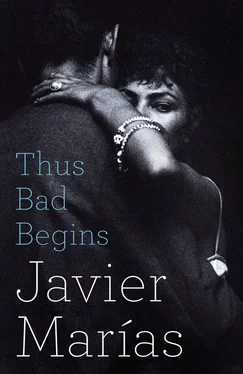Beatriz didn’t seem to mind, she may even have been grateful for his frank, frivolous humour. She laughed enough to make one think that the Professor was perhaps right to treat the whole episode with such healthy disrespect, and she promised him she would show him her wounds one day, before they had completely blended in with her natural skin colour.
‘But that will take a long time, Professor. Besides, I’ll always have the scars, so your curiosity is sure to be satisfied sooner or later.’
‘Don’t lie to me, Beatriz. These days, plastic surgery can erase anything. I know what you women are like. If you don’t resort to surgery, then you’ll cover your wrists with bracelets as big as hitching rings and there’ll be nothing to see. Don’t underestimate your future embarrassment, because it will come.’
‘I’m not lying to you, Professor. The next time they change my bandages, I’ll give you a call. Just don’t expect any artistry,’ said Beatriz, more seriously this time, as if she had just succumbed to an early attack of that predicted embarrassment or were reliving the moment when one liquid invaded another, the first drops of blood clouding the water, the signal for her to begin dying, to pine palely away. In fact, her voice faltered slightly when she spoke her next words. Rico was busy meticulously refilling his cigarette case, but even he noticed, looked up and listened with understanding and sorrow, a sorrow I shared. I felt a youthful desire to get up and embrace Beatriz and whisper softly: ‘There, there, it’s all right.’ I did not, however, give in to that inappropriate impulse. ‘It’s hard enough to get up the courage to cut yourself, and I preferred not to look. The foam from the bubble bath helped though.’
Something similar to an embrace happened shortly afterwards.
Dr Van Vechten used to drop by later in the morning to see how the wounds were healing and to change the bandages. He didn’t linger, it was more of a professional visit than a social one, and in my presence there was never any indication that what I knew to have happened between them ever did actually happen and perhaps it no longer did (in other people’s relationships, you never know when something begins or ends), they were both well practised at pretending; or perhaps, if they shared no strong feelings, no grand passions, they didn’t need to pretend. One day, I accompanied him to the front door (‘You stay where you are, Beatriz, I’ll see the Doctor out’), and on the landing, with the front door closed so that we couldn’t be heard, I seized the opportunity and asked:
‘Why doesn’t she go to a psychiatrist or a psychologist?’ And I gestured with my head towards the apartment. ‘I thought that was obligatory after any suicide attempt. Or at least advisable.’
He arched his eyebrows and took a deep breath in, his nostrils dilated. Then, breathing out again like someone summoning up all his patience, he said:
‘She has in the past. This time, we managed to keep her name out of the records at the clinic, so the psychiatric staff haven’t intervened, and it’s better like that. I don’t think she wants to go through all that again, having to repeat herself and listen to long silences and the occasional platitude. I’m afraid it would be of no benefit, no help to her. In her case, there’s really very little to know or find out. She’s not a happy woman, as I’m sure you’re aware by now, given how many hours you spend here. Sometimes she copes and sometimes she doesn’t. Let’s just hope many more years pass before she stops coping again.’ This must have struck him as too simplistic, because he immediately added: ‘Or, if you prefer, most of the time she lacks the necessary determination and only very occasionally doesn’t. We can only hope those few occasions take a long time to recur.’ He had basically said the same thing twice, but perhaps thought this second explanation more complex.
I presumed he didn’t know about Beatriz’s nocturnal incursions. The fact that she made these meant that she occasionally still had hopes, however vain, of changing Muriel’s mind, and so it wasn’t just that she lacked the determination to put an end to her life.
‘Eduardo hinted that there had been other attempts.’ Out of a kind of discretion, I didn’t want to admit that he had told me this openly and graphically.
‘Yes, and unless she accepts her situation or grows tired of trying or unless fear gets the better of her, then the normal thing would be for her to try again, sooner or later, and on one of those occasions, we won’t arrive in time.’
‘But knowing that, what can we do?’
‘Not much. Nothing really. If someone wants to kill herself, there’s no way you can stop her. It’s the same when someone decides to murder another person and isn’t concerned about eluding punishment or saving his own skin. If he really wants to do it, then he will, an opportunity will always present itself, even with the most protected and most alert of victims. How else explain the assassination of prominent figures? There’s no escape: if someone gets it into his head to kill you, he’ll do it regardless of what precautions you take. Doubt and a lack of resolve are the only reasons a murderer or a suicide, however inept or clumsy, will fail. With Beatriz, we were lucky, that’s all. Until the next time. If she keeps trying, then one day she’ll succeed.’
‘Do you think she lost her resolve on this last occasion?’
‘Maybe, maybe not. The cuts weren’t very deep, but that doesn’t mean much. It isn’t easy to cut your own flesh with a razor, the hand instinctively withdraws, stiffens, shrinks back. It’s nothing to do with willpower. The head may want to kill itself, but the hand resists inflicting harm. The truth is that if you hadn’t seen her going into the hotel, it would have taken a while, but even with those few cuts, she would have ended up bleeding to death. It was just luck. I’m sure she didn’t count on you seeing her go into the hotel and reporting back.’
‘But I saw her hours before supper. She would have had plenty of time to die if she’d been more diligent.’ I came out with that cold adjective, infected by Van Vechten’s use of language. I added: ‘If you know what I mean.’
The Doctor pulled a bored face, as if he were weary of telling me what to him was obvious, with his far greater experience of such matters.
‘These things take time when they’re premeditated, when they’re not a response to an impulse or a moment of blind emotion; and it’s perfectly normal that the person should keep putting it off, you know, just a little longer. Or perhaps she was afraid that if she got into the water too soon, she might get stomach cramps or something. It may seem ridiculous, but that’s how it is. Someone prepared to kill herself may, on the other hand, worry about suffering stomach cramps. I’ve known individuals decide not to jump from a window when they noticed how cold it was outside or how hard it was raining. They were more bothered about getting cold or wet as they fell than about hitting the ground. Who knows what might turn someone off at that point, what they might tell themselves or what might go through their mind.’ He did not include himself, even hypothetically, as most of us would; he could never imagine himself in such a situation. ‘Anyway, I have things to do.’
Yes, I had bored him with my questions. He didn’t seem deeply affected by Beatriz’s suicide attempt. It was more as if he’d decided that it was none of his business and that, if she tried again, we had no option but to let her, to wait and see. He had raced down Calle Velázquez and, at the hotel, had worked furiously, done everything he could; he had probably saved her life, which was why Muriel was so grateful to him. He was a responsible doctor, who would do his duty whenever anyone was in danger or sick. However, it was not up to him to take precautions or to stop someone doing what they wanted to do. Or else he simply knew it was pointless, or so he said. And yet I found his resignation, no, his bland acceptance, chilling. It seemed to me that no one was utterly devoted to Beatriz, that she wasn’t vital to anyone’s existence and was doubtless one of the many people about whom no one thinks passionately: ‘She doesn’t deserve to die. Ever.’
Читать дальше












